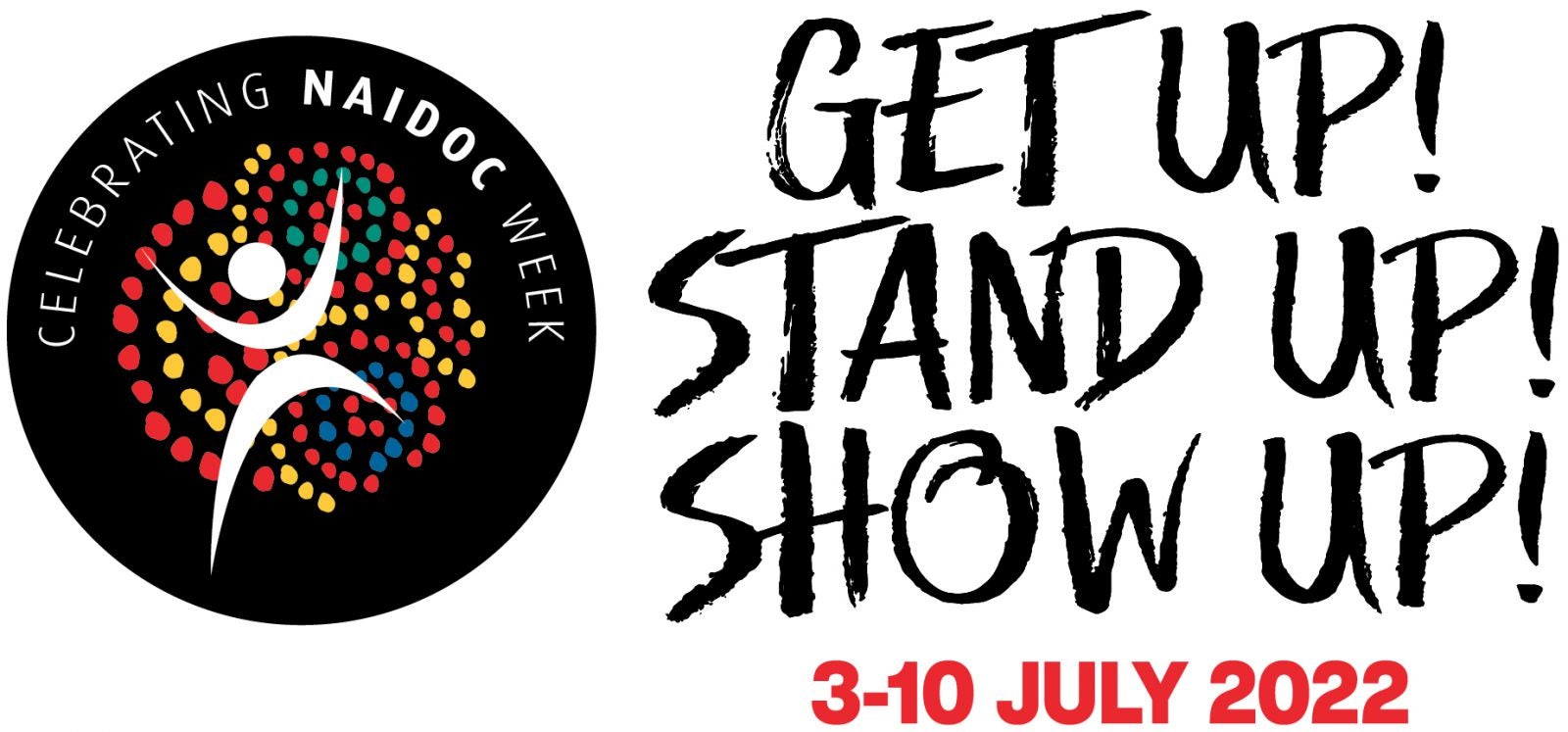
National Aboriginal and Torres Strait Islander Week (more commonly known as National NAIDOC Week) celebrates and recognises the history, culture and achievements of Aboriginal and Torres Strait Islander peoples, providing an important opportunity for all Australians to learn about First Nations cultures and histories. The theme for 2022 is Get Up! Stand Up! Show Up! and will be held across Australia from 3 to 10 July.
The theme this year was chosen because of the history of the earliest resistance fighters in the frontier wars through to our Aboriginal and Torres Strait Islander communities fighting for change today and always getting up, standing up, and showing up. It is a reminder that we all must continue to Get Up! Stand Up! Show Up! for systemic change including proper environmental, cultural and heritage protections, Constitutional change, a comprehensive process of truth-telling, working towards treaties, or calling out racism—we must do it together. We need to move beyond just acknowledgement, good intentions, empty words and promises, and hollow commitments. The relationship between Aboriginal and Torres Strait Islander peoples and non Indigenous Australians needs to be based on justice, equity, and the proper recognition of Aboriginal and Torres Strait Islander peoples’ rights.
Here are some ways you can get involved!
- Download and display this year’s NAIDOC Week poster
- Call someone in your community to chat about the theme ‘Get Up! Stand Up! Show Up!’
- Learn more about the Country on which you live and work using the AIATSIS Map
- Read a book, written and published by Indigenous authors and illustrators at Magabala Books
- Listen to music and podcasts from Aboriginal and Torres Strait Islander creators on Indigitube
- Support Indigenous businesses through Supply Nation Indigenous Business Direct
- Learn more about how deliver an Acknowledgement of Country
- Plan your Australian travel bucket list including Indigenous sites of significance or interest
- Join the conversation online using the NAIDOC Week hashtags #NAIDOC2022
National NAIDOC Week has a very important history to understand. Intended as a summary of the key dates only:
1920 – 1930
Before the 1920s, Aboriginal rights groups boycotted Australia Day (26 January) in protest against the status and treatment of Indigenous Australians but by the 1920s they were increasingly aware that the broader Australian public were largely ignorant of the boycotts. Several organisations attempted to drive change, but their efforts were largely overlooked, and due to police harassment, the work was abandoned in 1927.
1935
William Cooper drafted a petition to send to King George V, asking for special Aboriginal electorates in Federal Parliament. However, the Australian Government believed that the petition fell outside its constitutional responsibilities.
1938
On Australia Day (26 January), 1938, protestors marched through the streets of Sydney, followed by a congress attended by over a thousand people. This was one of the first major civil rights gatherings in the world and was known as the Day of Mourning.
A national policy for Aboriginal people was again proposed, but it was rejected again because the Australian Government did not hold constitutional powers in relation to Aboriginal people.
1940 – 1955
From 1940 until 1955, the Day of Mourning was held annually on the Sunday before Australia Day and was known as Aborigines Day. In 1955 Aborigines Day was shifted to the first Sunday in July after it was decided the day should become not simply a protest but also a celebration of Aboriginal culture.
1956 – 1990
Major Aboriginal organisations, state and federal governments and several church groups supported the formation of the National Aborigines Day Observance Committee (NADOC). At the same time, the second Sunday in July became a day of remembrance for Aboriginal people and their heritage.
In 1972, the Department of Aboriginal Affairs was formed as an outcome of the 1967 referendum.
In 1974, the NADOC committee was composed entirely of Aboriginal members for the first time and in the following year, it was decided that it should cover a week, the first to second Sunday in July.
In 1984, NADOC asked that National Aborigines Day be made a national public holiday to help celebrate and recognise the rich cultural history that makes Australia unique.
1991 – Present
With a growing awareness of the distinct cultural histories of Aboriginal and Torres Strait Islander peoples, NADOC was expanded to recognise Torres Strait Islander people and culture. The committee then became known as the National Aborigines and Islanders Day Observance Committee (NAIDOC).
Recognition towards the materials on which were used to prepare this summary article.
Article by: Courtenay Zajicek, Committee Member, ACC Australia Diversity, Equality and Inclusion Special Interest Group


ACC Australia is committed to promoting a diverse and inclusive in-house profession and has created the Diversity, Equality and Inclusion (DEI) Special Interest Group. If you are interested in participating in the special interest group or contributing ideas, please contact t.henderson@accglobal.com.